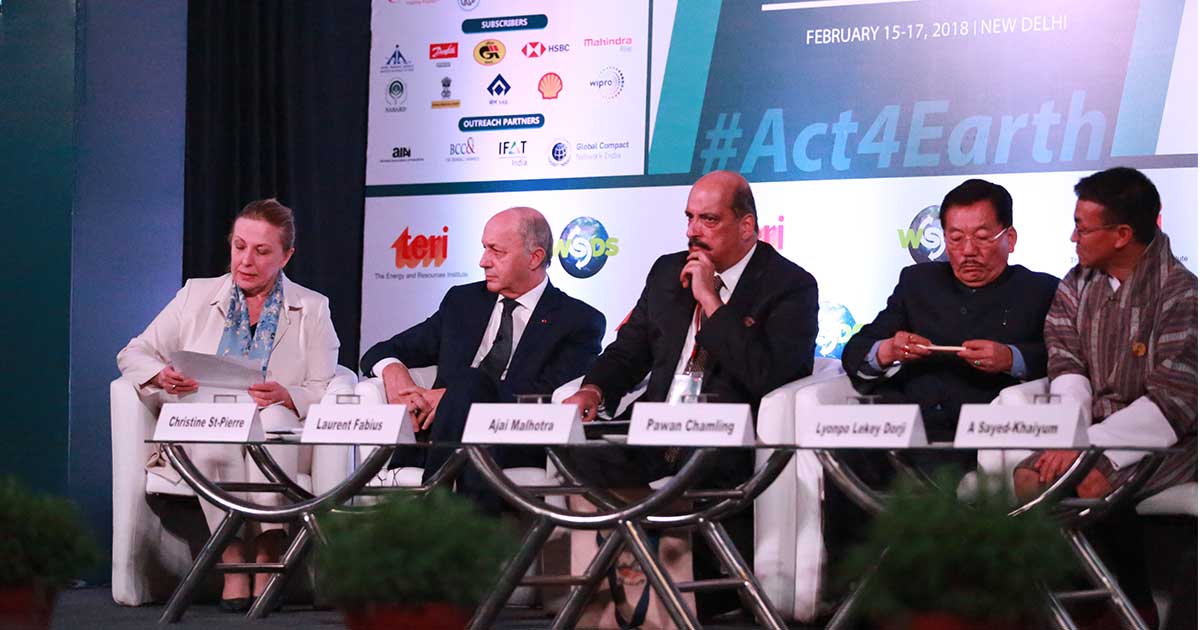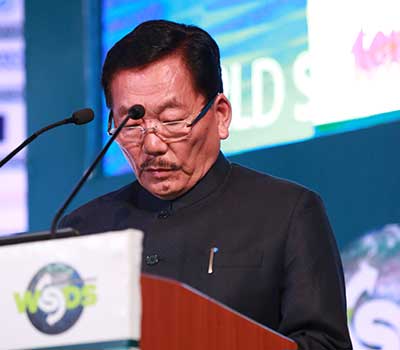
In the Quest for a Clean, Green Earth, You Need Partners
 Environmentalists, policymakers, and academics convene at the WSDS 2018 to discuss ways to forge public–private partnerships to build a more resilient earth
Environmentalists, policymakers, and academics convene at the WSDS 2018 to discuss ways to forge public–private partnerships to build a more resilient earth
The easy convenience of our modern life makes it easy to forget the devastating consequences our lifestyles can have on the environment. The hidden cost of that easy convenience is paid out by causing irreversible environmental damage. But, like the Former Secretary-General of the UN, Mr Ban Ki-moon, had rightly pointed out, "This is no Plan B because there is no planet B". In many ways, tackling environmental degradation and climate change, all the while securing sustainable development, presents many interlinked challenges, especially for the developing world.
The 2030 Agenda, with its 17 Sustainable Development Goals (SDGs) and 169 targets, and the Paris Agreement, with its Nationally Determined Contributions (NDCs), put forth ambitious frameworks for accelerating action to achieve sustainable development objectives and limit global temperature rise to well below 2 ◦C. With some innovation and a calibrated focus, action on achieving the SDGs can support steps needed for climate mitigation and adaptation.
In a special session titled 'Partnering to Create a Green, Clean, and Prosperous World at Stein Auditorium' organized at the ongoing WSDS 2018, an eminent panel of environmentalists, policymakers, ex-diplomats, and academics convened to discuss the various aspects of aligning climate commitments with the Sustainable Development Goals, and the roles partnerships can play in connecting the two agendas.
Sustainable economic development
 Mr Pawan Chamling, Hon'ble Chief Minister, Sikkim, believes that "Sustainable development for quality of living and for economic development largely depends on lean and green environment"
Mr Pawan Chamling, Hon'ble Chief Minister, Sikkim, believes that "Sustainable development for quality of living and for economic development largely depends on lean and green environment"
It is more important than ever before to ensure the goals of biodiversity conservation and economic development are not conflicting but are mutually reinforcing. This and only this will bring about what we call ‘environmentally sustainable’ economic development. Climate actions can strengthen the sustained development of society as a whole. However, these two processes are presently operating largely parallel to each other, despite areas of overlap and convergence, and there is scope for complementary actions.
As pointed out by Mr Pawan Chamling, Hon'ble Chief Minister, Sikkim, "Sustainable development for quality of living and for economic development largely depends on lean and green environment." Mr Chamling believes that the world today has become a dumping ground for chemicals contaminants. As a solution, he offered that all countries must "promote organic agriculture as a fashionable profession to attract all age groups of people across nations. Available data suggest that if we convert this earth into an organic world, we can contain carbon emissions by 50% in the future."
The need for Public Private partnerships:
Achieving these economic development, while being environmentally conscious, hinges upon our ability to forge effective partnerships between governments, the private sector, and civil society. In acknowledgment of this fact, the SDG 17 seeks to revitalize the global partnership for sustainable development and explicitly recognizes multi-stakeholder partnerships as important vehicles for mobilizing and sharing knowledge, expertise, technologies, and financial resources to support the achievement of global development agendas.
Reinforcing this idea, Mr Aiyaz Sayed-Khaiyum, Attorney-General and Minister for Economy, Public Enterprises, Civil Service and Communications, Government of Republic of Fiji, believes that, to address the grave issue of climate change, “there is a need to involve both public private partnerships in particular”. He further added that, unlike very few countries, Fiji has a climate change division. "The idea is to mainstream it", he said.